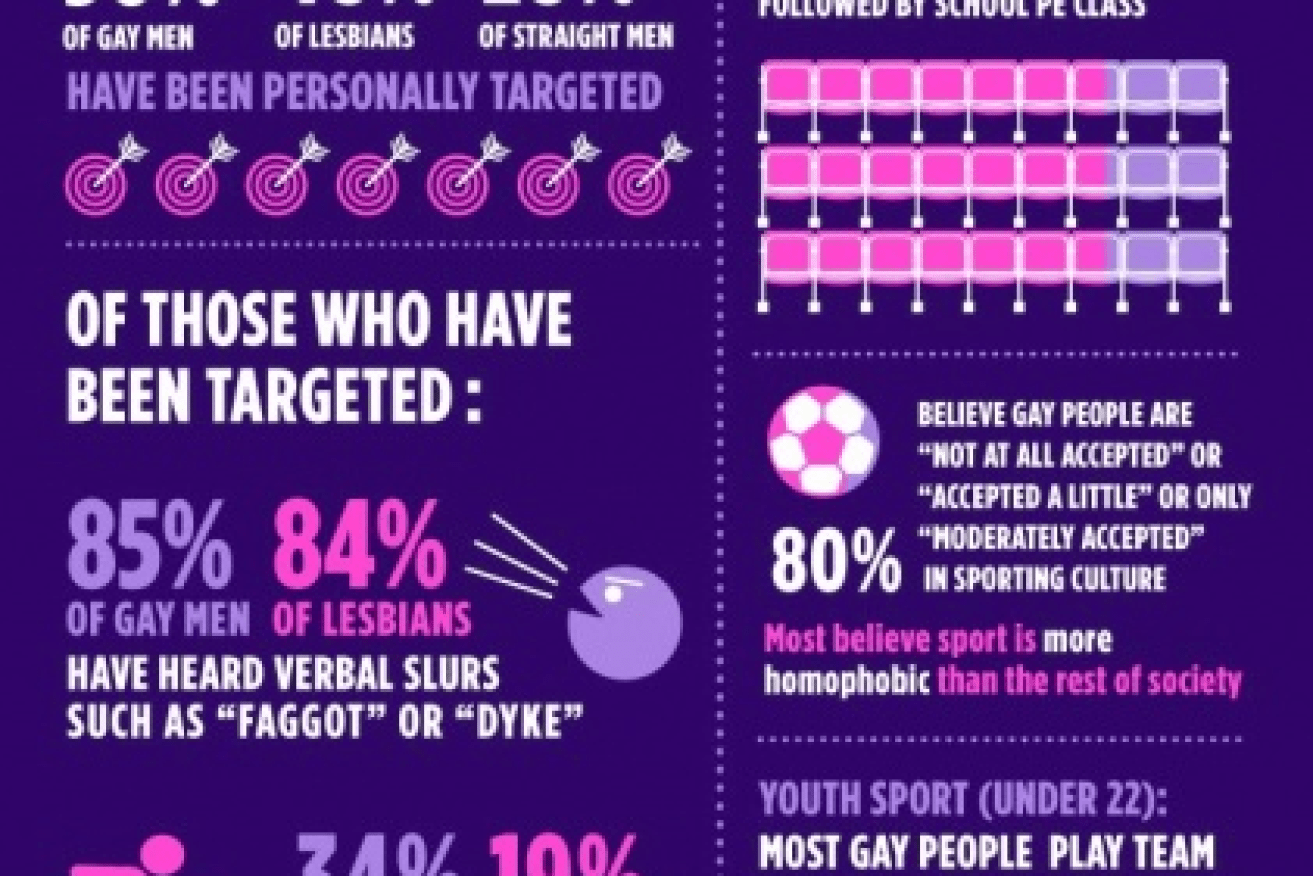Sport ‘not safe’ for gays and lesbians, study finds

Australia’s major sporting codes say they will develop policies to help eliminate homophobia in sport after an international study found the vast majority of gays and lesbians did not feel accepted.
The Out On The Fields study found 80 per cent of those involved in sport in Australia believed gays and lesbians were not accepted within the sporting community.
The majority (70 per cent) feel youth sport in Australia is not safe and supportive for gay people.
• Vocal hero: why Mitch Clark’s battle inspires
• The best sports docos of all time
• A-League rivalry comes of age
Nearly 9,500 people took part in the largest international study on homophobia in sport, involving the UK, US, Canada, New Zealand and Australia.
More than 3,000 lesbian, gay, bisexual and straight Australians took part.
The study found nine out of 10 young people felt they could not be honest about their sexuality, with many citing discrimination from coaches and officials as the main reason for keeping it a secret.
Australia had the highest number of gay men who believed they were not “at all accepted” in sport with 13 per cent, compared to Canada at 5 per cent.
The study was commissioned by the Bingham Cup gay rugby competition and a coalition of other sporting organisations. 
The study’s convenor Andrew Purchas said he was surprised the results were so poor, but the major sporting codes – Cricket Australia, AFL, NRL, Rugby Union and Football Federation Australia – were taking the issue seriously.
“We shared the preliminary results with them over the last month or so and I’m very encouraged to say that they understand the problem, they take it very seriously and they’re committed to improving it,” he said.
He said the codes had committed to developing a Pride in Sport index that would provide a benchmark for the level of inclusiveness of each sport.
The codes would work with the Human Rights Commission and the Australian Sports Commission to develop the index.
“There needs to be policies and programs put in place by the sporting codes to not only ensure there’s no homophobic activity, but also that they create a positive and inclusive environment,” Mr Purchas said.
“There also needs to be bottom-up, grassroots activity to let people know there is no place for homophobia.”
Cricket Australia said it welcomed the study and was committed to implementing the Pride in Sport index.
“The findings of the study are concerning,” CEO James Sutherland said in a statement.
“But the support of the study by Australian cricket – and sport more broadly – shows we are eager to better understand homophobia in sport and take action against it.”
Many young gays, lesbians avoiding team sports
Xavier Goldie now plays with the Melbourne Chargers gay rugby team, but said he avoided playing team sport when he was younger.
“I didn’t come out until my final year of high school. Certainly for most of my high school, I didn’t want to be in any situation where I was going to be called out for being gay or bullied for it,” he said.
“So I, just like most people, avoided playing any team sports.
“From my conversations with my peers as well, after you finish compulsory physical education, you get out as quickly as you can.
“The amount of bullying and homophobic language that is bandied around in locker rooms makes you feel really exposed.
“You fear for your physical safety but you will be outed, so you bail on physical activity and don’t play any team sports.”
Sport ‘missing out’ on talent
Mr Goldie welcomed the support from the major sporting codes.
“It is absolutely vital for young gay people to see that there are people who are straight, who also won’t stand homophobia in sport,” he said.
“It’s a real loss for sport in general when there is a whole pool of talent that feels they can’t participate.
“They may be quite excellent players of their respective codes, but they don’t have anyone to turn to or look to, to see a good example of what they can do in their sport, so they leave it. “
Mr Purchas said there was still a long way to go to stamp out homophobia in sport.
“I think this identifies there is still a residual problem around sport that perhaps isn’t the case in the rest of society,” Mr Purchas said.
“We’ve seen the way things have changed in broader society. We have more athletes coming out after they’ve finished sport,” he said.
“It’s a generational process. What’s important is that sports take an active step in ensuring they create an inclusive environment.”
– ABC








